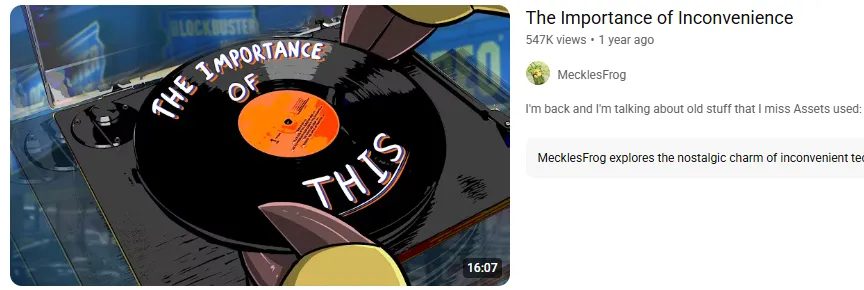A Strategic Analog
When I watched Mission Impossible 7 with my brother back in '23, I was fascinated by the scene where Kittridge shows Denlinger his analog control station for tracking down Ethan Hunt. He explains that the facility is completely safe from the "digitally based" AI-fueled nightmare called The Entity. I had read, of course, that there are files in the U.S. government that are so secret that they only existed in print and could only be accessed by certain people at certain places at certain times. Analog, it turns out, is the only antidote to a digital threat.
When I look at the explosion of analog media both in online spaces and how-to videos, I see something similar at work. Perhaps these people aren't trying to protect their identities or shield their banking passwords by buying vinyls and adopting cassette players, but there's still a protective element at work. People are trying to protect their attention, their sanity, their joy. In short, people are trying to protect their sense of purpose and being by reasserting control over an ocean of over-stimulating and all-consuming "content." This, at the same time, as yet another ocean is already developing built entirely on AI slop.

To make matters worse, the institutions we put in charge of our security fail us as often as they protect us. I need not recount all the times that my student loan provider has been hacked nor the number of times that my SSN has been bought and sold on the dark web for reasons beyond my control. None of us own our identities anymore. If we are to participate in society, we have to give up our credentials to custodians whom we know will ultimately fail to protect it. We will have no recourse save for a year or two of free-yet-crappy identity theft monitoring services.
Enough is enough.
It has become clear that our current system of convenience at the cost of security is no longer viable. We cannot continue to allow our personal information--not just our "data" but our livelihoods--to be hacked, mined, pumped, and dumped without our say. What we need, therefore, is a strategically analog approach to both security and living.
Here's what I mean: for those services which do not require our sensitive information to operate online, I think of email systems like Gmail, we can provide standardly requested information digitally. However, for services which request vital or key information such as Social Security Numbers or Driver's License ID numbers, those details should only be transmitted in person and kept in a physical location to be shared with only in a verifiably human and direct manner. At no point should this data be exposed to a digital server. In fact, we should go as far as to criminalize the digitization of such personal information in the same way that we criminalize AIDS carriers for knowingly spreading the disease without informing their partners.
While this approach might seem extreme, paper record keeping worked just fine for centuries before the advent of digital technology. Perhaps there are ways to hybridize the approach: for example, by using encrypted phone calls via WhatsApp or Signal to transmit key information to a person who can store it in an analog medium. Whatever we do, it must be clear by now that our current approach cannot survive the quantum age. Not only do we not seem to know how to program quantum computers, from what I gather, no one seems to know how to program a quantum-proof encryption system. Goodness, we're still stuck on whether encryption is a good thing or not.
This is not to say that digital technology is to be feared and hated and every turn. Of course not. Digital tech has revolutionized our ability to communicate with each other, share ideas, and bridge serious gaps. But we must also face the reality that this convenience cannot be relied upon.
When I think of strategic analog, I think of this example from the car industry: manufacturers are returning to using analog buttons in their car entertainment consoles (Android Auto, Apple CarPlay, etc.) because using a touch screen while driving is not only a horrible experience but dangerous beyond compare.
If we think that texting while driving is a problem, wait till Spotify mishears your command to play that new Taylor Swift song and instead kicks up Rick Astley's "Never Gonna Give You Up" while you're in the heat of Atlanta traffic.
The formula is simple: analog where analog makes sense; digital where digital makes sense.
For our security, our sanity, and our future, let's ditch the drive to digitize everything. Not every convenience is a godsend. When China decides to attack us, or when the sun decides to kill us, we might lose our tech, but we could still have everything else.